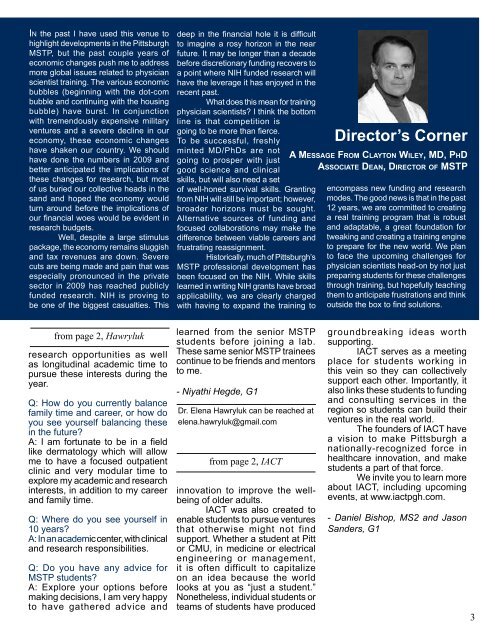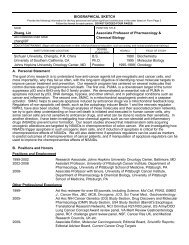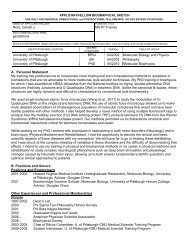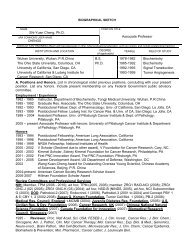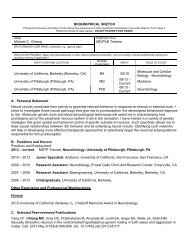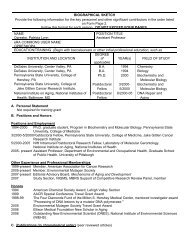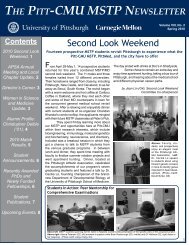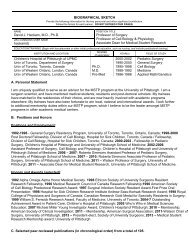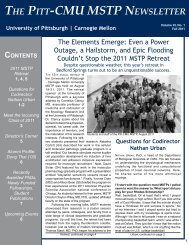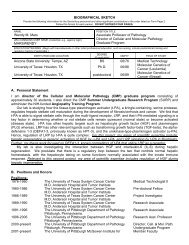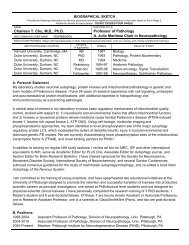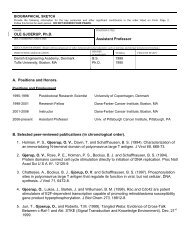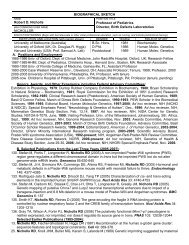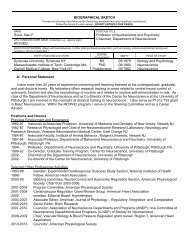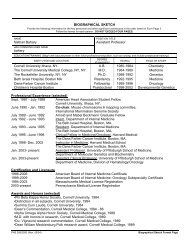The PiTT-CMU MSTP NewSleTTer - University of Pittsburgh :: MSTP
The PiTT-CMU MSTP NewSleTTer - University of Pittsburgh :: MSTP
The PiTT-CMU MSTP NewSleTTer - University of Pittsburgh :: MSTP
Create successful ePaper yourself
Turn your PDF publications into a flip-book with our unique Google optimized e-Paper software.
In the past I have used this venue to<br />
highlight developments in the <strong>Pittsburgh</strong><br />
<strong>MSTP</strong>, but the past couple years <strong>of</strong><br />
economic changes push me to address<br />
more global issues related to physician<br />
scientist training. <strong>The</strong> various economic<br />
bubbles (beginning with the dot-com<br />
bubble and continuing with the housing<br />
bubble) have burst. In conjunction<br />
with tremendously expensive military<br />
ventures and a severe decline in our<br />
economy, these economic changes<br />
have shaken our country. We should<br />
have done the numbers in 2009 and<br />
better anticipated the implications <strong>of</strong><br />
these changes for research, but most<br />
<strong>of</strong> us buried our collective heads in the<br />
sand and hoped the economy would<br />
turn around before the implications <strong>of</strong><br />
our financial woes would be evident in<br />
research budgets.<br />
Well, despite a large stimulus<br />
package, the economy remains sluggish<br />
and tax revenues are down. Severe<br />
cuts are being made and pain that was<br />
especially pronounced in the private<br />
sector in 2009 has reached publicly<br />
funded research. NIH is proving to<br />
be one <strong>of</strong> the biggest casualties. This<br />
deep in the financial hole it is difficult<br />
to imagine a rosy horizon in the near<br />
future. It may be longer than a decade<br />
before discretionary funding recovers to<br />
a point where NIH funded research will<br />
have the leverage it has enjoyed in the<br />
recent past.<br />
What does this mean for training<br />
physician scientists I think the bottom<br />
line is that competition is<br />
going to be more than fierce.<br />
To be successful, freshly<br />
minted MD/PhDs are not<br />
going to prosper with just<br />
good science and clinical<br />
skills, but will also need a set<br />
<strong>of</strong> well-honed survival skills. Granting<br />
from NIH will still be important; however,<br />
broader horizons must be sought.<br />
Alternative sources <strong>of</strong> funding and<br />
focused collaborations may make the<br />
difference between viable careers and<br />
frustrating reassignment.<br />
Historically, much <strong>of</strong> <strong>Pittsburgh</strong>’s<br />
<strong>MSTP</strong> pr<strong>of</strong>essional development has<br />
been focused on the NIH. While skills<br />
learned in writing NIH grants have broad<br />
applicability, we are clearly charged<br />
with having to expand the training to<br />
Director’s Corner<br />
A Message From Clayton Wiley, MD, PhD<br />
Associate Dean, Director <strong>of</strong> <strong>MSTP</strong><br />
encompass new funding and research<br />
modes. <strong>The</strong> good news is that in the past<br />
12 years, we are committed to creating<br />
a real training program that is robust<br />
and adaptable, a great foundation for<br />
tweaking and creating a training engine<br />
to prepare for the new world. We plan<br />
to face the upcoming challenges for<br />
physician scientists head-on by not just<br />
preparing students for these challenges<br />
through training, but hopefully teaching<br />
them to anticipate frustrations and think<br />
outside the box to find solutions.<br />
from page 2, Hawryluk<br />
research opportunities as well<br />
as longitudinal academic time to<br />
pursue these interests during the<br />
year.<br />
Q: How do you currently balance<br />
family time and career, or how do<br />
you see yourself balancing these<br />
in the future<br />
A: I am fortunate to be in a field<br />
like dermatology which will allow<br />
me to have a focused outpatient<br />
clinic and very modular time to<br />
explore my academic and research<br />
interests, in addition to my career<br />
and family time.<br />
Q: Where do you see yourself in<br />
10 years<br />
A: In an academic center, with clinical<br />
and research responsibilities.<br />
Q: Do you have any advice for<br />
<strong>MSTP</strong> students<br />
A: Explore your options before<br />
making decisions, I am very happy<br />
to have gathered advice and<br />
learned from the senior <strong>MSTP</strong><br />
students before joining a lab.<br />
<strong>The</strong>se same senior <strong>MSTP</strong> trainees<br />
continue to be friends and mentors<br />
to me.<br />
- Niyathi Hegde, G1<br />
Dr. Elena Hawryluk can be reached at<br />
elena.hawryluk@gmail.com<br />
from page 2, IACT<br />
innovation to improve the wellbeing<br />
<strong>of</strong> older adults.<br />
IACT was also created to<br />
enable students to pursue ventures<br />
that otherwise might not find<br />
support. Whether a student at Pitt<br />
or <strong>CMU</strong>, in medicine or electrical<br />
engineering or management,<br />
it is <strong>of</strong>ten difficult to capitalize<br />
on an idea because the world<br />
looks at you as “just a student.”<br />
Nonetheless, individual students or<br />
teams <strong>of</strong> students have produced<br />
groundbreaking ideas worth<br />
supporting.<br />
IACT serves as a meeting<br />
place for students working in<br />
this vein so they can collectively<br />
support each other. Importantly, it<br />
also links these students to funding<br />
and consulting services in the<br />
region so students can build their<br />
ventures in the real world.<br />
<strong>The</strong> founders <strong>of</strong> IACT have<br />
a vision to make <strong>Pittsburgh</strong> a<br />
nationally-recognized force in<br />
healthcare innovation, and make<br />
students a part <strong>of</strong> that force.<br />
We invite you to learn more<br />
about IACT, including upcoming<br />
events, at www.iactpgh.com.<br />
- Daniel Bishop, MS2 and Jason<br />
Sanders, G1<br />
3


